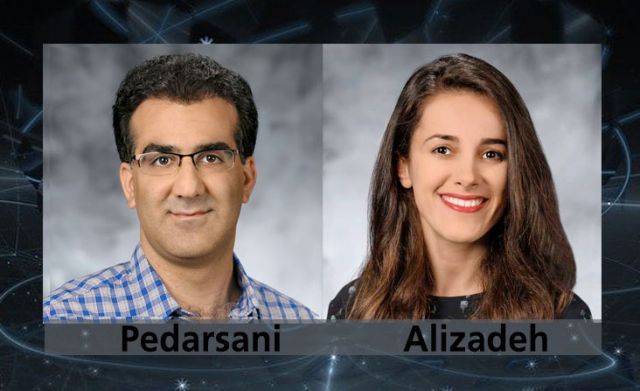IEE Funding: Pedarsani & Alizadeh
ECE Professors Ramtin Pedarsani and Mahnoosh Alizadeh project with high-impact potential seeking to solve grand challenges of energy efficiency awarded seed funding from UCSB’s Institute for Energy Efficiency

The IEE is an interdisciplinary research institute committed to improving energy efficiency across three key themes: smart societal infrastructure, computing and communications, and the food-energy-water nexus. Each project will receive up to $50,000 in critical seed funding, which is intended to produce preliminary results that the scientists can use to apply for major external funding to expand their research.
“Supporting projects in the early stages of development is an essential step to the creation and delivery of high-impact solutions for energy efficiency,” said John Bowers, IEE director and professor of electrical and computer engineering at UCSB. “Each seed project addresses and attacks a grand challenge by taking an innovative approach that has tremendous potential. They also foster new research collaborations and leverage IEE’s legacy of scientific discovery.”
“The review committee was thrilled by the proposals in terms of how innovative they were, how the seed funding could really help the faculty move new efforts along, and how the research, if successful, could lead to additional funding opportunities,” said Mark Abel, associate director and executive advisor of IEE.
The seed grants bring the pioneering research of five assistant professors from the College of Engineering’s Mechanical Engineering and Electrical and Computer Engineering departments to the IEE.
Electrical and computer engineering professors Mahnoosh Alizadeh and Ramtin Pedarsani have collaborated to reduce a community’s carbon footprint. In recent years, community energy management systems (CEMS) have been developed to regulate a community’s energy demand based on distributed network control and resource-allocation algorithms. But because customers cannot predict their energy needs and solar energy outputs are difficult to forecast, a significant amount of the supply-demand balancing is left to real-time decisions, which adversely affects future time periods. In addition, such distributed algorithms are not resilient in the face of adversarial influences. In their project, called “Distributed and Safe Real-Time Control Mechanisms for Community Energy Management,” Alizadeh and Pedarsani plan to solve these existing challenges by designing secure algorithms for real-time and online energy balancing.
“We plan to design sequential allocation and optimizing algorithms that can operate online as requests for energy come in, and guarantee a level of performance,” said Alizadeh, who received an Early CAREER Award from the National Science Foundation in 2019. “Our proposed algorithms will allow communities to take concrete steps toward reducing their carbon footprint by investing in shared resources, such as community energy storage, while feeling confident that their privacy and security are not adversely affected.”
The seed funding is supported by gifts from private donors, such as John MacFarlane, a member of the IEE Directors Council. Support from an anonymous donor allowed the IEE to award an additional grant this year.
COE News – "IEE Awards Seed Funding to Three High-Impact Efficiency Projects" (full article)